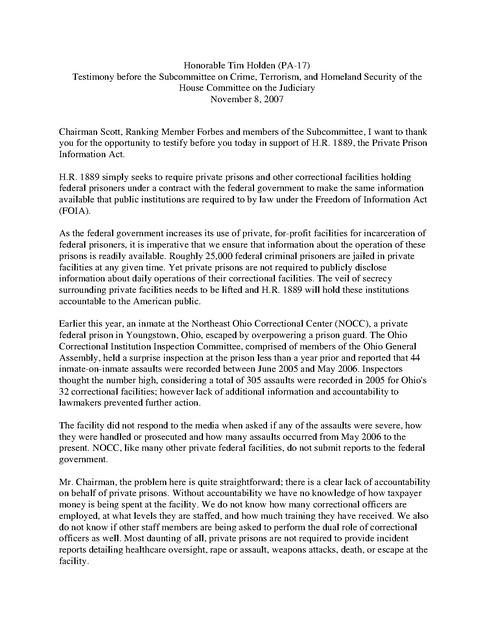Rep Tim Holden Testimony on Plra Reform Bill 2007
Download original document:

Document text

Document text
This text is machine-read, and may contain errors. Check the original document to verify accuracy.
Honorable Tim Holden (PA-17) Testimony before the Subcommittee on Crime, Terrorism, and Homeland Security of the House Committee on the Judiciary November 8, 2007 Chairman Scott, Ranking Member Forbes and members of the Subcommittee, I want to thank you for the opportunity to testify before you today in support of H.R. 1889, the Private Prison Information Act. H.R. 1889 simply seeks to require private prisons and other correctional facilities holding federal prisoners under a contract with the federal government to make the same information available that public institutions are required to by law under the Freedom of Information Act (FOIA). As the federal government increases its use of private, for-profit facilities for incarceration of federal prisoners, it is imperative that we ensure that information about the operation of these prisons is readily available. Roughly 25,000 federal criminal prisoners are jailed in private facilities at any given time. Yet private prisons are not required to publicly disclose information about daily operations of their correctional facilities. The veil of secrecy surrounding private facilities needs to be lifted and H.R. 1889 will hold these institutions accountable to the American public. Earlier this year, an inmate at the Northeast Ohio Correctional Center (NOCC), a private federal prison in Youngstown, Ohio, escaped by overpowering a prison guard. The Ohio Correctional Institution Inspection Committee, comprised of members of the Ohio General Assembly, held a surprise inspection at the prison less than a year prior and reported that 44 inmate-on-inmate assaults were recorded between June 2005 and May 2006. Inspectors thought the number high, considering a total of 305 assaults were recorded in 2005 for Ohio's 32 correctional facilities; however lack of additional information and accountability to lawmakers prevented further action. The facility did not respond to the media when asked if any of the assaults were severe, how they were handled or prosecuted and how many assaults occurred from May 2006 to the present. NOCC, like many other private federal facilities, do not submit reports to the federal government. Mr. Chairman, the problem here is quite straightforward; there is a clear lack of accountability on behalf of private prisons. Without accountability we have no knowledge of how taxpayer money is being spent at the facility. We do not know how many correctional officers are employed, at what levels they are staffed, and how much training they have received. We also do not know if other staff members are being asked to perform the dual role of correctional officers as well. Most daunting of all, private prisons are not required to provide incident reports detailing healthcare oversight, rape or assault, weapons attacks, death, or escape at the facility. Prior to being elected to Congress, I served seven years as Sheriff of Schuylkill County, Pennsylvania. In that capacity, I also served on the Schuylkill County Prison Board. Based on my experiences as both sheriff and a member of the board, I strongly believe that running correctional facilities is inherently governmental. Although that is not what I am hear to talk about today, I also strongly believe that H.R. 1889 will put private prisons on the same playing field with the rules and regulations by which federal prisons must abide. Mr. Chairman, if we do not address this critical situation, we risk the safety and security of not only the prison employees, but also that of our family and friends who live in our communities. This legislation simply ensures the public's right to have access to information concerning the conditions within private prisons. I thank the Subcommittee for considering this bill and urge you to report it favorably.

